- Home
- Haruki Murakami
Desire Page 2
Desire Read online
Page 2
‘Stop the car!’
I slammed on the brakes.
‘This is the place,’ she said.
The shops along the street had their shutters rolled down, forming dark, silent walls on either side. A barbershop sign hung in the dark like a twisted, chilling glass eye. There was a bright McDonald’s hamburger sign some two hundred yards ahead, but nothing else.
‘I don’t see any bakery,’ I said.
Without a word, she opened the glove compartment and pulled out a roll of cloth-backed tape. Holding this, she stepped out of the car. I got out my side. Kneeling at the front end, she tore off a length of tape and covered the numbers on the license plate. Then she went around to the back and did the same. There was a practiced efficiency to her movements. I stood on the curb staring at her.
‘We’re going to take that McDonald’s,’ she said, as coolly as if she were announcing what we would have for dinner.
‘McDonald’s is not a bakery,’ I pointed out to her.
‘It’s like a bakery,’ she said. ‘Sometimes you have to compromise. Let’s go.’
I drove to the McDonald’s and parked in the lot. She handed me the blanket-wrapped shotgun.
‘I’ve never fired a gun in my life,’ I protested.
‘You don’t have to fire it. Just hold it. Okay? Do as I say. We walk right in, and as soon as they say “Welcome to McDonald’s,” we slip on our masks. Got that?’
‘Sure, but—’
‘Then you shove the gun in their faces and make all the workers and customers get together. Fast. I’ll do the rest.’
‘But—’
‘How many hamburgers do you think we’ll need? Thirty?’
‘I guess so.’ With a sigh, I took the shotgun and rolled back the blanket a little. The thing was as heavy as a sandbag and as black as a dark night.
‘Do we really have to do this?’ I asked, half to her and half to myself.
‘Of course we do.’
Wearing a McDonald’s hat, the girl behind the counter flashed me a McDonald’s smile and said, ‘Welcome to McDonald’s.’ I hadn’t thought that girls would work at McDonald’s late at night, so the sight of her confused me for a second. But only for a second. I caught myself and pulled on the mask. Confronted with this suddenly masked duo, the girl gaped at us.
Obviously, the McDonald’s hospitality manual said nothing about how to deal with a situation like this. She had been starting to form the phrase that comes after ‘Welcome to McDonald’s,’ but her mouth seemed to stiffen and the words wouldn’t come out. Even so, like a crescent moon in the dawn sky, the hint of a professional smile lingered at the edges of her lips.
As quickly as I could manage, I unwrapped the shotgun and aimed it in the direction of the tables, but the only customers there were a young couple – students, probably – and they were facedown on the plastic table, sound asleep. Their two heads and two strawberry-milk-shake cups were aligned on the table like an avant-garde sculpture. They slept the sleep of the dead. They didn’t look likely to obstruct our operation, so I swung my shotgun back toward the counter.
All together, there were three McDonald’s workers. The girl at the counter, the manager – a guy with a pale, egg-shaped face, probably in his late twenties – and a student type in the kitchen – a thin shadow of a guy with nothing on his face that you could read as an expression. They stood together behind the register, staring into the muzzle of my shotgun like tourists peering down an Incan well. No one screamed, and no one made a threatening move. The gun was so heavy I had to rest the barrel on top of the cash register, my finger on the trigger.
‘I’ll give you the money,’ said the manager, his voice hoarse. ‘They collected it at eleven, so we don’t have too much, but you can have everything. We’re insured.’
‘Lower the front shutter and turn off the sign,’ said my wife.
‘Wait a minute,’ said the manager. ‘I can’t do that. I’ll be held responsible if I close up without permission.’
My wife repeated her order, slowly. He seemed torn.
‘You’d better do what she says,’ I warned him.
He looked at the muzzle of the gun atop the register, then at my wife, and then back at the gun. He finally resigned himself to the inevitable. He turned off the sign and hit a switch on an electrical panel that lowered the shutter. I kept my eye on him, worried that he might hit a burglar alarm, but apparently McDonald’s don’t have burglar alarms. Maybe it had never occurred to anybody to attack one.
The front shutter made a huge racket when it closed, like an empty bucket being smashed with a baseball bat, but the couple sleeping at their table was still out cold. Talk about a sound sleep: I hadn’t seen anything like that in years.
‘Thirty Big Macs. For takeout,’ said my wife.
‘Let me just give you the money,’ pleaded the manager. ‘I’ll give you more than you need. You can go buy food somewhere else. This is going to mess up my accounts and—’
‘You’d better do what she says,’ I said again.
The three of them went into the kitchen area together and started making the thirty Big Macs. The student grilled the burgers, the manager put them in buns, and the girl wrapped them up. Nobody said a word.
I leaned against a big refrigerator, aiming the gun toward the griddle. The meat patties were lined up on the griddle like brown polka dots, sizzling. The sweet smell of grilling meat burrowed into every pore of my body like a swarm of microscopic bugs, dissolving into my blood and circulating to the farthest corners, then massing together inside my hermetically sealed hunger cavern, clinging to its pink walls.
A pile of white-wrapped burgers was growing nearby. I wanted to grab and tear into them, but I could not be certain that such an act would be consistent with our objective. I had to wait. In the hot kitchen area, I started sweating under my ski mask.
The McDonald’s people sneaked glances at the muzzle of the shotgun. I scratched my ears with the little finger of my left hand. My ears always get itchy when I’m nervous. Jabbing my finger into an ear through the wool, I was making the gun barrel wobble up and down, which seemed to bother them. It couldn’t have gone off accidentally, because I had the safety on, but they didn’t know that and I wasn’t about to tell them.
My wife counted the finished hamburgers and put them into two small shopping bags, fifteen burgers to a bag.
‘Why do you have to do this?’ the girl asked me. ‘Why don’t you just take the money and buy something you like? What’s the good of eating thirty Big Macs?’
I shook my head.
My wife explained, ‘We’re sorry, really. But there weren’t any bakeries open. If there had been, we would have attacked a bakery.’
That seemed to satisfy them. At least they didn’t ask any more questions. Then my wife ordered two large Cokes from the girl and paid for them.
‘We’re stealing bread, nothing else,’ she said. The girl responded with a complicated head movement, sort of like nodding and sort of like shaking. She was probably trying to do both at the same time. I thought I had some idea how she felt.
My wife then pulled a ball of twine from her pocket – she came equipped – and tied the three to a post as expertly as if she were sewing on buttons. She asked if the cord hurt, or if anyone wanted to go to the toilet, but no one said a word. I wrapped the gun in the blanket, she picked up the shopping bags, and out we went. The customers at the table were still asleep, like a couple of deep-sea fish. What would it have taken to rouse them from a sleep so deep?
We drove for a half hour, found an empty parking lot by a building, and pulled in. There we ate hamburgers and drank our Cokes. I sent six Big Macs down to the cavern of my stomach, and she ate four. That left twenty Big Macs in the back seat. Our hunger – that hunger that had felt as if it could go on forever – vanished as the dawn was breaking. The first light of the sun dyed the building’s filthy walls purple and made a giant SONY BETA ad tower glow with painful intensity. Soon the
whine of highway truck tires was joined by the chirping of birds. The American Armed Forces radio was playing cowboy music. We shared a cigarette. Afterward, she rested her head on my shoulder.
‘Still, was it really necessary for us to do this?’ I asked.
‘Of course it was!’ With one deep sigh, she fell asleep against me. She felt as soft and as light as a kitten.
Alone now, I leaned over the edge of my boat and looked down to the bottom of the sea. The volcano was gone. The water’s calm surface reflected the blue of the sky. Little waves – like silk pajamas fluttering in a breeze – lapped against the side of the boat. There was nothing else.
I stretched out in the bottom of the boat and closed my eyes, waiting for the rising tide to carry me where I belonged.
—translated by Jay Rubin
On Seeing the 100% Perfect Girl One Beautiful April Morning
ONE BEAUTIFUL APRIL morning, on a narrow side street in Tokyo’s fashionable Harajuku neighborhood, I walk past the 100% perfect girl.
Tell you the truth, she’s not that good-looking. She doesn’t stand out in any way. Her clothes are nothing special. The back of her hair is still bent out of shape from sleep. She isn’t young, either—must be near thirty, not even close to a “girl,” properly speaking. But still, I know from fifty yards away: She’s the 100% perfect girl for me. The moment I see her, there’s a rumbling in my chest, and my mouth is as dry as a desert.
Maybe you have your own particular favorite type of girl—one with slim ankles, say, or big eyes, or graceful fingers, or you’re drawn for no good reason to girls who take their time with every meal. I have my own preferences, of course. Sometimes in a restaurant I’ll catch myself staring at the girl at the table next to mine because I like the shape of her nose.
But no one can insist that his 100% perfect girl correspond to some preconceived type. Much as I like noses, I can’t recall the shape of hers – or even if she had one. All I can remember for sure is that she was no great beauty. It’s weird.
‘Yesterday on the street I passed the 100% perfect girl,’ I tell someone.
‘Yeah?’ he says. ‘Good-looking?’
‘Not really.’
‘Your favorite type, then?’
‘I don’t know. I can’t seem to remember anything about her – the shape of her eyes or the size of her breasts.’
‘Strange.’
‘Yeah. Strange.’
‘So anyhow,’ he says, already bored, ‘what did you do? Talk to her? Follow her?’
‘Nah. Just passed her on the street.’
She’s walking east to west, and I west to east. It’s a really nice April morning.
Wish I could talk to her. Half an hour would be plenty: just ask her about herself, tell her about myself, and – what I’d really like to do – explain to her the complexities of fate that have led to our passing each other on a side street in Harajuku on a beautiful April morning in 1981. This was something sure to be crammed full of warm secrets, like an antique clock built when peace filled the world.
After talking, we’d have lunch somewhere, maybe see a Woody Allen movie, stop by a hotel bar for cocktails. With any kind of luck, we might end up in bed.
Potentiality knocks on the door of my heart.
Now the distance between us has narrowed to fifteen yards.
How can I approach her? What should I say?
‘Good morning, miss. Do you think you could spare half an hour for a little conversation?’
Ridiculous. I’d sound like an insurance salesman.
‘Pardon me, but would you happen to know if there is an all-night cleaners in the neighborhood?’
No, this is just as ridiculous. I’m not carrying any laundry, for one thing. Who’s going to buy a line like that?
Maybe the simple truth would do. ‘Good morning. You are the 100% perfect girl for me.’
No, she wouldn’t believe it. Or even if she did, she might not want to talk to me. Sorry, she could say, I might be the 100% perfect girl for you, but you’re not the 100% perfect boy for me. It could happen. And if I found myself in that situation, I’d probably go to pieces. I’d never recover from the shock. I’m thirty-two, and that’s what growing older is all about.
We pass in front of a flower shop. A small, warm air mass touches my skin. The asphalt is damp, and I catch the scent of roses. I can’t bring myself to speak to her. She wears a white sweater, and in her right hand she holds a crisp white envelope lacking only a stamp. So: She’s written somebody a letter, maybe spent the whole night writing, to judge from the sleepy look in her eyes. The envelope could contain every secret she’s ever had.
I take a few more strides and turn: She’s lost in the crowd.
NOW, OF COURSE, I know exactly what I should have said to her. It would have been a long speech, though, far too long for me to have delivered it properly. The ideas I come up with are never very practical.
Oh, well. It would have started ‘Once upon a time’ and ended ‘A sad story, don’t you think?’
ONCE UPON A time, there lived a boy and a girl. The boy was eighteen and the girl sixteen. He was not unusually handsome, and she was not especially beautiful. They were just an ordinary lonely boy and an ordinary lonely girl, like all the others. But they believed with their whole hearts that somewhere in the world there lived the 100% perfect boy and the 100% perfect girl for them. Yes, they believed in a miracle. And that miracle actually happened.
One day the two came upon each other on the corner of a street.
‘This is amazing,’ he said. ‘I’ve been looking for you all my life. You may not believe this, but you’re the 100% perfect girl for me.’
‘And you,’ she said to him, ‘are the 100% perfect boy for me, exactly as I’d pictured you in every detail. It’s like a dream.’
They sat on a park bench, held hands, and told each other their stories hour after hour. They were not lonely anymore. They had found and been found by their 100% perfect other. What a wonderful thing it is to find and be found by your 100% perfect other. It’s a miracle, a cosmic miracle.
As they sat and talked, however, a tiny, tiny sliver of doubt took root in their hearts: Was it really all right for one’s dreams to come true so easily?
And so, when there came a momentary lull in their conversation, the boy said to the girl, ‘Let’s test ourselves – just once. If we really are each other’s 100% perfect lovers, then sometime, somewhere, we will meet again without fail. And when that happens, and we know that we are the 100% perfect ones, we’ll marry then and there. What do you think?’
‘Yes,’ she said, ‘that is exactly what we should do.’
And so they parted, she to the east, and he to the west.
The test they had agreed upon, however, was utterly unnecessary. They should never have undertaken it, because they really and truly were each other’s 100% perfect lovers, and it was a miracle that they had ever met. But it was impossible for them to know this, young as they were. The cold, indifferent waves of fate proceeded to toss them unmercifully.
One winter, both the boy and the girl came down with the season’s terrible influenza, and after drifting for weeks between life and death they lost all memory of their earlier years. When they awoke, their heads were as empty as the young D. H. Lawrence’s piggy bank.
They were two bright, determined young people, however, and through their unremitting efforts they were able to acquire once again the knowledge and feeling that qualified them to return as full-fledged members of society. Heaven be praised, they became truly upstanding citizens who knew how to transfer from one subway line to another, who were fully capable of sending a special-delivery letter at the post office. Indeed, they even experienced love again, sometimes as much as 75% or even 85% love.
Time passed with shocking swiftness, and soon the boy was thirty-two, the girl thirty.
One beautiful April morning, in search of a cup of coffee to start the day, the boy was walking from west to east,
while the girl, intending to send a special-delivery letter, was walking from east to west, both along the same narrow street in the Harajuku neighborhood of Tokyo. They passed each other in the very center of the street. The faintest gleam of their lost memories glimmered for the briefest moment in their hearts. Each felt a rumbling in the chest. And they knew:
She is the 100% perfect girl for me.
He is the 100% perfect boy for me.
But the glow of their memories was far too weak, and their thoughts no longer had the clarity of fourteen years earlier. Without a word, they passed each other, disappearing into the crowd. Forever.
A sad story, don’t you think?
YES, THAT’S IT, that is what I should have said to her.
—translated by Jay Rubin
Birthday Girl
SHE WAITED ON tables as usual that day, her twentieth birthday. She always worked on Fridays, but if things had gone according to plan that particular Friday, she would have had the night off. The other part-time girl had agreed to switch shifts with her as a matter of course: being screamed at by an angry chef while lugging pumpkin gnocchi and seafood fritto misto to customers’ tables was no way to spend one’s twentieth birthday. But the other girl had aggravated a cold and gone to bed with unstoppable diarrhoea and a fever of 104°, so she ended up working after all at short notice.
She found herself trying to comfort the sick girl, who had called to apologise. ‘Don’t worry about it,’ she said. ‘I wasn’t going to do anything special anyway, even if it is my twentieth birthday.’
And in fact she was not all that disappointed. One reason was the terrible argument she had had a few days earlier with the boyfriend who was supposed to be with her that night. They had been going together since school. The argument had started from nothing much, but it had taken an unexpected turn for the worse until it became a long and bitter shouting match – one bad enough, she was pretty sure, to have snapped their long-standing ties once and for all. Something inside her had turned rock hard and died. He had not called her since the blow-up, and she was not going to call him.

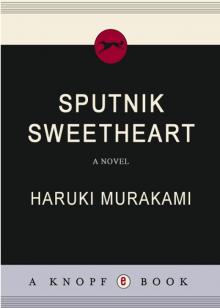 Sputnik Sweetheart
Sputnik Sweetheart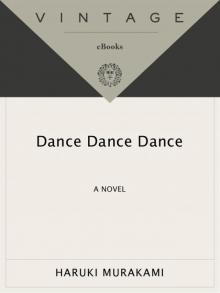 Dance Dance Dance
Dance Dance Dance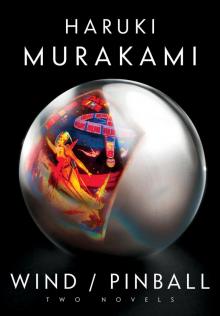 The Wind (1) and Up Bird Chronicle (2)
The Wind (1) and Up Bird Chronicle (2)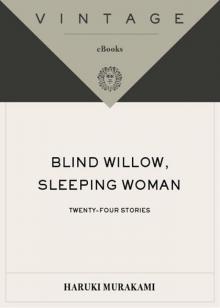 Blind Willow, Sleeping Woman
Blind Willow, Sleeping Woman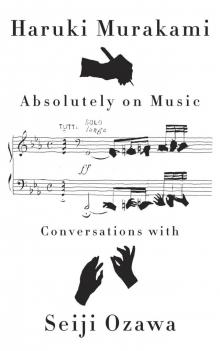 Absolutely on Music: Conversations With Seiji Ozawa
Absolutely on Music: Conversations With Seiji Ozawa Norwegian Wood
Norwegian Wood South of the Border, West of the Sun
South of the Border, West of the Sun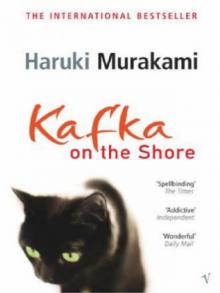 Kafka on the Shore
Kafka on the Shore Men Without Women
Men Without Women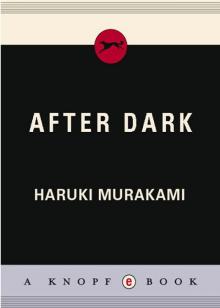 After Dark
After Dark Hard-Boiled Wonderland and the End of the World
Hard-Boiled Wonderland and the End of the World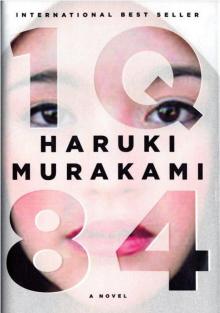 1q84
1q84 The Wind-Up Bird Chronicle
The Wind-Up Bird Chronicle Underground: The Tokyo Gas Attack and the Japanese Psyche
Underground: The Tokyo Gas Attack and the Japanese Psyche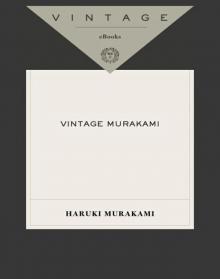 Vintage Murakami
Vintage Murakami The Elephant Vanishes: Stories
The Elephant Vanishes: Stories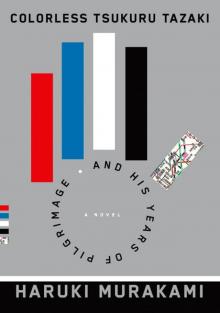 Colorless Tsukuru Tazaki and His Years of Pilgrimage
Colorless Tsukuru Tazaki and His Years of Pilgrimage First Person Singular
First Person Singular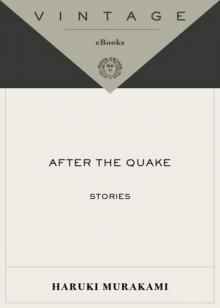 After the Quake
After the Quake A Wild Sheep Chase
A Wild Sheep Chase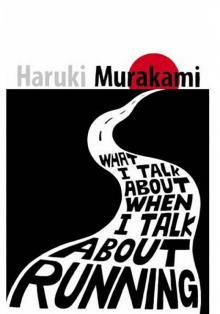 What I Talk About When I Talk About Running
What I Talk About When I Talk About Running Birthday Girl
Birthday Girl The Elephant Vanishes
The Elephant Vanishes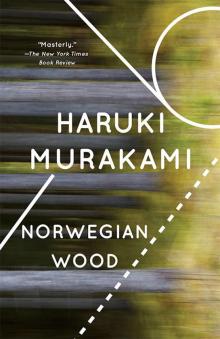 Norwegian Wood (Vintage International)
Norwegian Wood (Vintage International)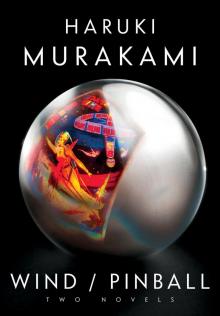 Wind/Pinball
Wind/Pinball Norwegian Wood Vol 1.
Norwegian Wood Vol 1. Underground
Underground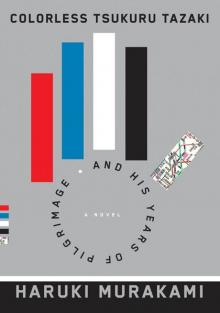 Colorless Tsukuru Tazaki and His Years of Pilgrimage: A novel
Colorless Tsukuru Tazaki and His Years of Pilgrimage: A novel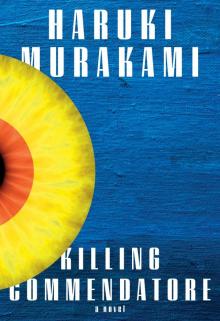 Killing Commendatore
Killing Commendatore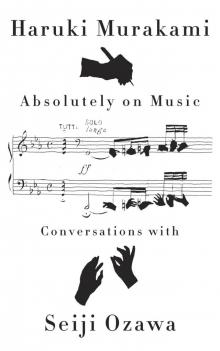 Absolutely on Music
Absolutely on Music